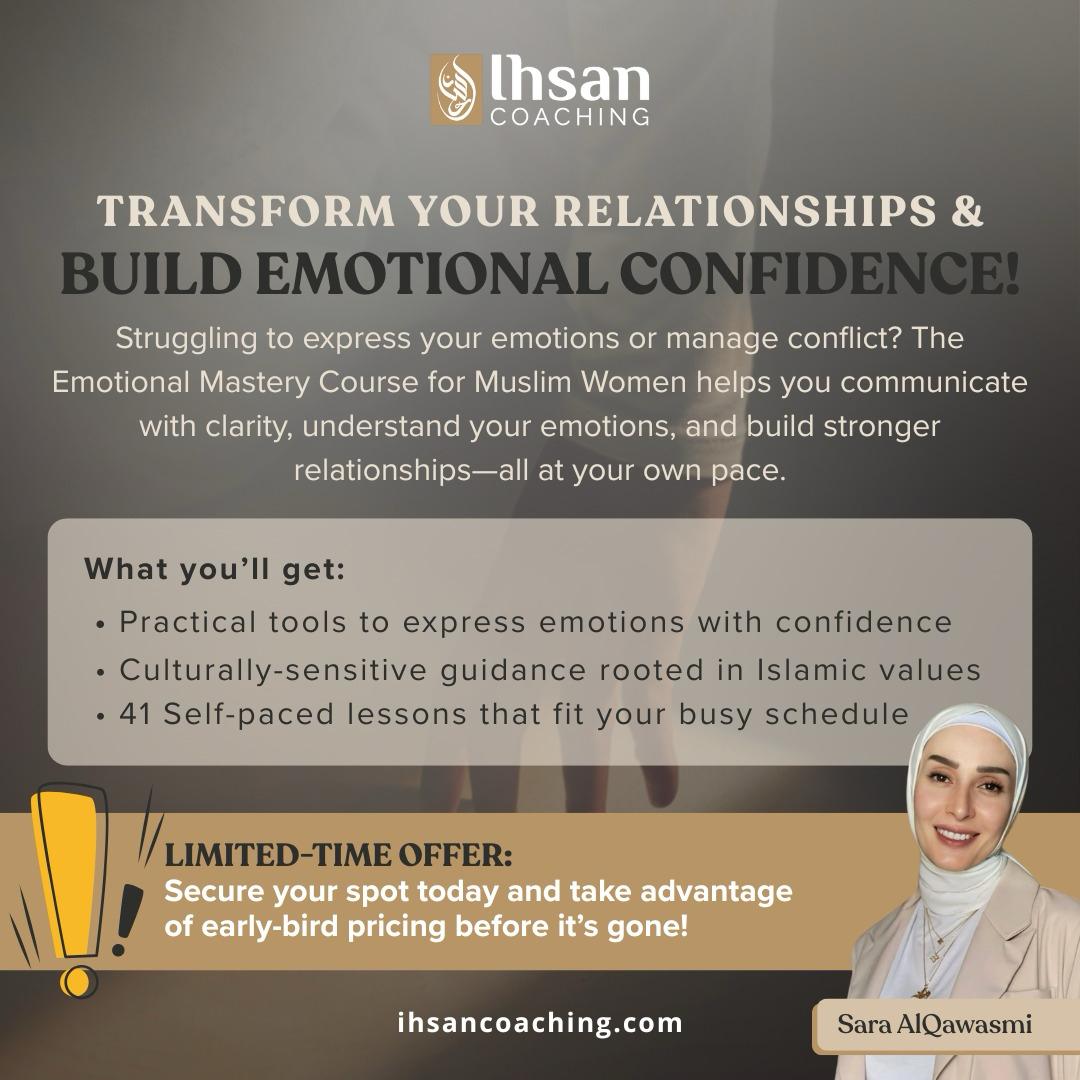Anger is a powerful emotion that, if left unchecked, can negatively affect our relationships, mental health, and spiritual well-being. For Muslims, managing anger is not only a personal responsibility, but a spiritual obligation. In Islam, controlling anger is seen as a sign of maturity, self-discipline, and submission to Allah’s will.
Let’s learn how Islamic teachings, religious consultation, and individual coaching can help Muslims control their anger. One can achieve long-lasting emotional balance and a deeper connection with Allah by integrating spiritual wisdom and modern coaching techniques.
The Significance of Controlling Anger in Islam
While anger is a natural human emotion, it can lead to harmful consequences. Islam greatly emphasizes managing emotions, especially anger, and encourages believers to adopt patience (sabr), forgiveness, and forbearance. The Qur’an and the teachings of the Prophet Muhammad (peace be upon him) provide guidelines on how to deal with this powerful emotion.
Islamic Teachings on Anger Control
The Qur’an and Hadith teaches Muslims to resist the urge to let anger dictate their behavior. One of the key Qur’anic verses that addresses anger is from Surah Al-Imran:
“Those who spend in ease and in hardship, and who restrain anger and who pardon the people – and Allah loves the doers of good.” (Surah Al-Imran 3:134)
(وَالَّذِينَ يَجْتَنِبُونَ فَجْرَاتِهَا وَالَّذِينَ يَكْظِمُونَ الْغَيْظَ وَالْعَافِينَ عَنِ النَّاسِ وَاللَّهُ يُحِبُّ الْمُحْسِنِينَ)
This verse teaches us that restraining anger and forgiving others is an esteemed quality in Islam. It emphasizes that controlling anger improves interpersonal relationships and brings us closer to Allah.
The Role of Individual Coaching in Anger Management
Personalized Coaching for Managing Anger
Managing anger can be particularly challenging in our fast-paced world, where stress is ever-present. While Islamic teachings are crucial, modern-day tools like individual coaching can complement faith-based approaches. Personalized coaching, especially by a Muslim coach, can help individuals identify triggers and provide strategies for emotional regulation based on Islamic principles.
How Muslim Coaching is Different
Muslim coaching stands apart from general coaching in that it incorporates faith-based practices, such as prayer, mindfulness, and Quranic teachings. For example, a Muslim coach may teach breathing exercises alongside Quranic verses that help soothe the soul in moments of anger. These sessions aim to help individuals become more self-aware and gain better control over their emotions.
Spiritual Guidance for Managing Anger
Developing Sabr (Patience) Through Faith
In Islam, patience (sabr) is central to dealing with anger. When anger arises, it is important to pause and remember the teachings of Prophet Muhammad (peace be upon him), who emphasized the importance of self-restraint. The following Qur’anic verse highlights the significance of sabr:
“O you who have believed, seek help through patience and prayer. Indeed, Allah is with the patient.” (Surah Al-Baqarah 2:153)
(يَا أَيُّهَا الَّذِينَ آمَنُوا اسْتَعِينُوا بِالصَّبْرِ وَالصَّلَاةِ إِنَّ اللَّهَ مَعَ الصَّابِرِينَ)
This verse reminds us that patience and prayer are the keys to overcoming emotional turbulence when facing moments of anger. Developing patience requires practice and trust in Allah’s wisdom, knowing He is always with those who are patient.
Forgiveness as a Remedy for Anger
In addition to patience, Islam places great importance on forgiveness. Forgiving others can alleviate the burden of anger, enabling us to find peace in our hearts. Prophet Muhammad (peace be upon him) said:
Hadith (Sahih Al-Bukhari)
“The strong man is not the one who overcomes people by his strength, but the one who controls himself while in anger.”
Forgiving those who wrong us is not only a noble act but also an act of spiritual purification. It can be transformative, releasing negative emotions and restoring inner calm.

The Psychological Approach to Anger Management
The Root Causes of Anger
Anger often stems from underlying issues such as frustration, fear, or unresolved hurt. Identifying these root causes can help in addressing anger more effectively. A Muslim coach can guide individuals through this process by exploring their emotional triggers and helping them understand the underlying factors contributing to their anger.
Combined with Islamic wisdom, this psychological insight allows individuals to confront their anger with greater clarity and a sense of control.
Techniques for Controlling Anger
Muslim coaching incorporates several practical techniques for managing anger. Some of these include:
- Mindfulness
Be aware of your emotions and acknowledge them before reacting.
- Breathing Exercises
Deep breathing can help calm the body and mind during moments of anger.
- Positive Affirmations
Reciting affirmations reinforcing patience and forgiveness, such as “Hasbunallahu wa ni’mal wakeel” (Sufficient for us is Allah, and He is the best disposition of affairs).
These methods help individuals respond to anger in a measured and thoughtful way that aligns with Islamic values.
Religious Consultation and Its Importance in Anger Management
Seeking Guidance from Islamic Scholars and Counselors
For Muslims, seeking religious consultation from scholars and counselors can provide a valuable perspective on anger management. These professionals can offer advice grounded in Islamic tradition and provide practical steps for dealing with anger in a way that aligns with faith.
Often local imams and qualified Muslim counselors offer sessions that combine spiritual guidance with practical tools for emotional regulation. This can include group discussions, classes on patience and forgiveness, and personalized sessions for those struggling with anger.
How Religious Guidance Complements Coaching
When combined with individual coaching, religious consultation offers a holistic approach to anger management. It provides the spiritual nourishment and psychological strategies needed to deal with anger effectively, ensuring that individuals address their emotional challenges from a well-rounded perspective.

How Ihsan Coaching Can Help
Ihsan Coaching offers individual coaching designed specifically to help Muslims control their anger. This coaching method integrates principles of Islam with modern psychological practices to provide personalized guidance and strategies for managing anger. With the help of experienced Muslim coaches, you can develop greater self-awareness, emotional regulation, and spiritual peace.
FAQs
-
How does controlling anger bring me closer to Allah?
Controlling anger is seen as an act of self-restraint and spiritual discipline in Islam. It aligns with the teachings of the Prophet Muhammad (peace be upon him) and brings us closer to Allah by demonstrating patience, forgiveness, and humility.
-
How can individual coaching help in controlling anger?
Individual coaching helps by providing personalized support, identifying emotional triggers, and offering strategies based on Islamic principles and psychological techniques for managing anger effectively.
-
What is the significance of sabr (patience) in controlling anger?
Sabr, or patience, is fundamental in dealing with anger. By practicing patience, a person can pause, reflect, and respond with wisdom, preventing impulsive reactions that may lead to harm.
-
Why is forgiveness important in Islam for anger management?
Forgiveness helps to release negative emotions and restore peace of mind. It is a key aspect of anger management in Islam, as forgiving others is a form of spiritual cleansing and self-improvement.
-
Can religious consultation be combined with coaching for anger management?
Yes, combining religious consultation with coaching provides a holistic approach, integrating spiritual guidance with psychological strategies to manage anger and promote emotional well-being.




